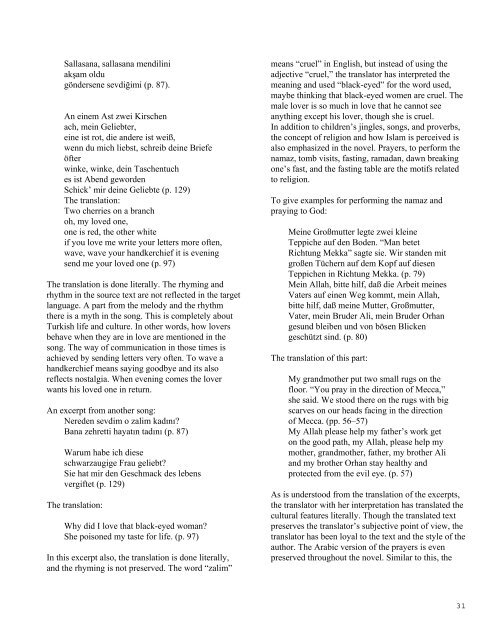their - The University of Texas at Dallas
their - The University of Texas at Dallas
their - The University of Texas at Dallas
You also want an ePaper? Increase the reach of your titles
YUMPU automatically turns print PDFs into web optimized ePapers that Google loves.
Sallasana, sallasana mendilini<br />
akşam oldu<br />
göndersene sevdiğimi (p. 87).<br />
An einem Ast zwei Kirschen<br />
ach, mein Geliebter,<br />
eine ist rot, die andere ist weiß,<br />
wenn du mich liebst, schreib deine Briefe<br />
öfter<br />
winke, winke, dein Taschentuch<br />
es ist Abend geworden<br />
Schick’ mir deine Geliebte (p. 129)<br />
<strong>The</strong> transl<strong>at</strong>ion:<br />
Two cherries on a branch<br />
oh, my loved one,<br />
one is red, the other white<br />
if you love me write your letters more <strong>of</strong>ten,<br />
wave, wave your handkerchief it is evening<br />
send me your loved one (p. 97)<br />
<strong>The</strong> transl<strong>at</strong>ion is done literally. <strong>The</strong> rhyming and<br />
rhythm in the source text are not reflected in the target<br />
language. A part from the melody and the rhythm<br />
there is a myth in the song. This is completely about<br />
Turkish life and culture. In other words, how lovers<br />
behave when they are in love are mentioned in the<br />
song. <strong>The</strong> way <strong>of</strong> communic<strong>at</strong>ion in those times is<br />
achieved by sending letters very <strong>of</strong>ten. To wave a<br />
handkerchief means saying goodbye and its also<br />
reflects nostalgia. When evening comes the lover<br />
wants his loved one in return.<br />
An excerpt from another song:<br />
Nereden sevdim o zalim kadını<br />
Bana zehretti hay<strong>at</strong>ın tadını (p. 87)<br />
Warum habe ich diese<br />
schwarzaugige Frau geliebt<br />
Sie h<strong>at</strong> mir den Geschmack des lebens<br />
vergiftet (p. 129)<br />
<strong>The</strong> transl<strong>at</strong>ion:<br />
Why did I love th<strong>at</strong> black-eyed woman<br />
She poisoned my taste for life. (p. 97)<br />
In this excerpt also, the transl<strong>at</strong>ion is done literally,<br />
and the rhyming is not preserved. <strong>The</strong> word “zalim”<br />
means “cruel” in English, but instead <strong>of</strong> using the<br />
adjective “cruel,” the transl<strong>at</strong>or has interpreted the<br />
meaning and used “black-eyed” for the word used,<br />
maybe thinking th<strong>at</strong> black-eyed women are cruel. <strong>The</strong><br />
male lover is so much in love th<strong>at</strong> he cannot see<br />
anything except his lover, though she is cruel.<br />
In addition to children’s jingles, songs, and proverbs,<br />
the concept <strong>of</strong> religion and how Islam is perceived is<br />
also emphasized in the novel. Prayers, to perform the<br />
namaz, tomb visits, fasting, ramadan, dawn breaking<br />
one’s fast, and the fasting table are the motifs rel<strong>at</strong>ed<br />
to religion.<br />
To give examples for performing the namaz and<br />
praying to God:<br />
Meine Großmutter legte zwei kleine<br />
Teppiche auf den Boden. “Man betet<br />
Richtung Mekka” sagte sie. Wir standen mit<br />
großen Tüchern auf dem Kopf auf diesen<br />
Teppichen in Richtung Mekka. (p. 79)<br />
Mein Allah, bitte hilf, daß die Arbeit meines<br />
V<strong>at</strong>ers auf einen Weg kommt, mein Allah,<br />
bitte hilf, daß meine Mutter, Großmutter,<br />
V<strong>at</strong>er, mein Bruder Ali, mein Bruder Orhan<br />
gesund bleiben und von bösen Blicken<br />
geschützt sind. (p. 80)<br />
<strong>The</strong> transl<strong>at</strong>ion <strong>of</strong> this part:<br />
My grandmother put two small rugs on the<br />
floor. “You pray in the direction <strong>of</strong> Mecca,”<br />
she said. We stood there on the rugs with big<br />
scarves on our heads facing in the direction<br />
<strong>of</strong> Mecca. (pp. 56–57)<br />
My Allah please help my f<strong>at</strong>her’s work get<br />
on the good p<strong>at</strong>h, my Allah, please help my<br />
mother, grandmother, f<strong>at</strong>her, my brother Ali<br />
and my brother Orhan stay healthy and<br />
protected from the evil eye. (p. 57)<br />
As is understood from the transl<strong>at</strong>ion <strong>of</strong> the excerpts,<br />
the transl<strong>at</strong>or with her interpret<strong>at</strong>ion has transl<strong>at</strong>ed the<br />
cultural fe<strong>at</strong>ures literally. Though the transl<strong>at</strong>ed text<br />
preserves the transl<strong>at</strong>or’s subjective point <strong>of</strong> view, the<br />
transl<strong>at</strong>or has been loyal to the text and the style <strong>of</strong> the<br />
author. <strong>The</strong> Arabic version <strong>of</strong> the prayers is even<br />
preserved throughout the novel. Similar to this, the<br />
31

















